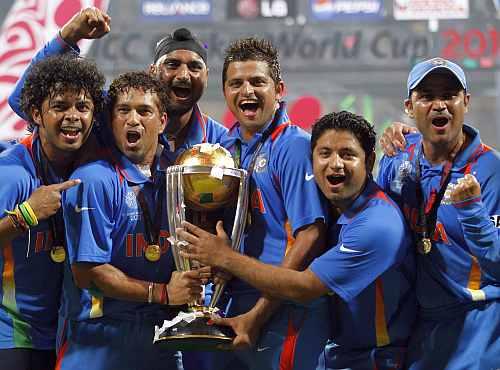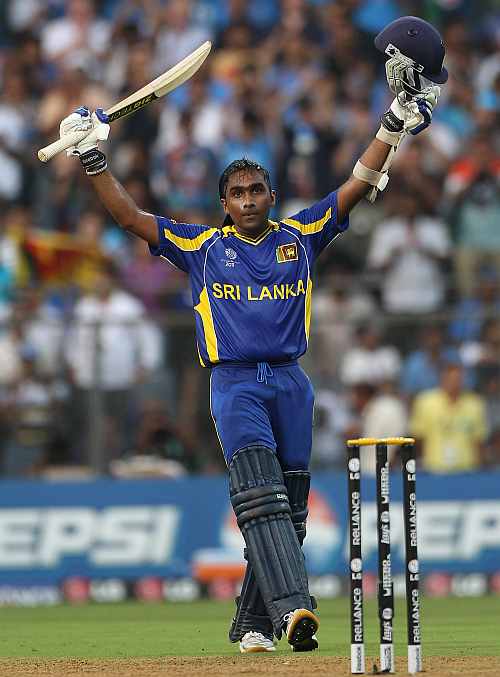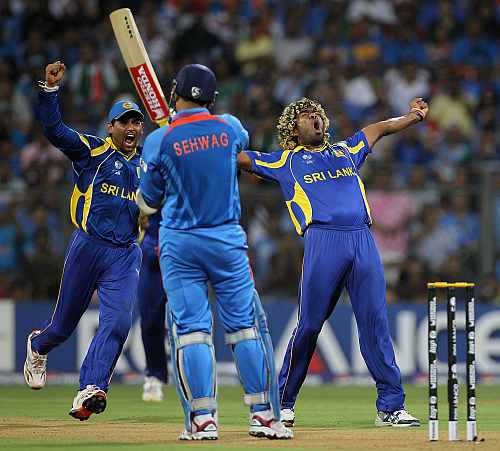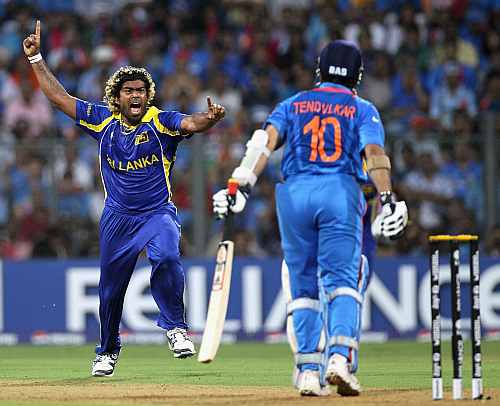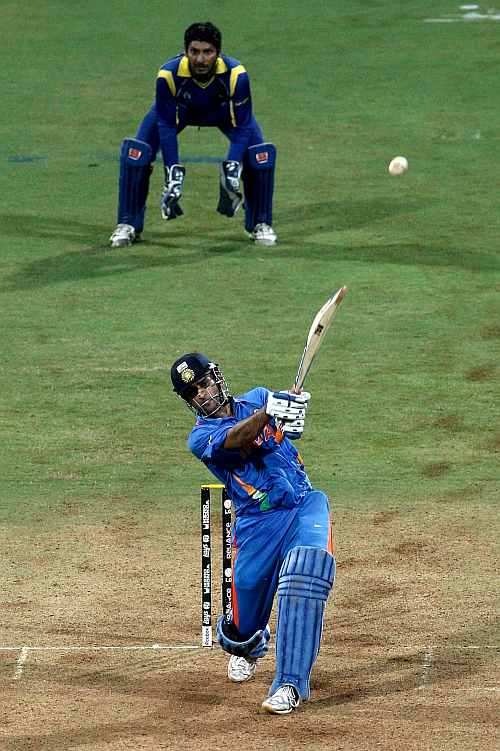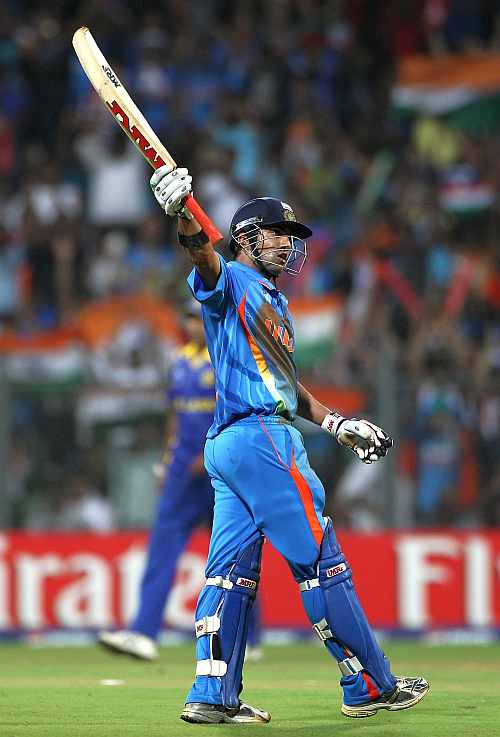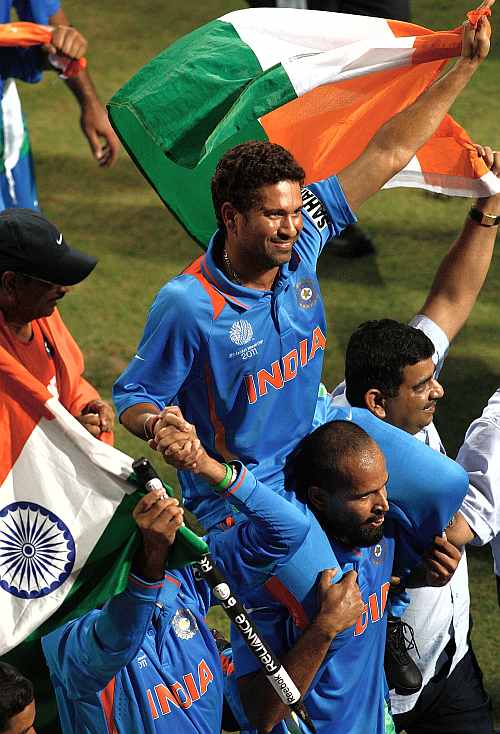 | « Back to article | Print this article |
When the Lankan Titanic ran into Iceberg Dhoni!
Shreekant Sambrani looks back at this day last year, when all of India celebrated a magnificent triumph.
They say three things and three things only unite India: politics, films and cricket.
I disagree. Politics is too divisive, as we see it only too often. Films bring out linguistic and regional preferences, which could also divide us.
Cricket, however transcends all and unites us. Sachin Tendulkar is the only hero the whole country dotes on. Last year, this day, he was joined by 14 others, as India won its second cricket World Cup in a thriller that would easily eclipse the fictitious Lagaan.
I must admit at the outset that cricket arouses in me the deepest sense of patriotism (which is not much in evidence otherwise), bordering on jingoism.
I don't want any team to win against India, ever, and certainly not any of our sub-continental neighbours. In my scheme of priorities, India is followed by Australia, South Africa, New Zealand, West Indies, England, Bangladesh, Sri Lanka and Pakistan, in that order.
So had India lost the Mohali match leading to a Pakistan-Sri Lanka final, I would have most likely not watched it at all.
I must also confess that all my claims to rationality give way when it comes to crunch cricket matches. Even for the most critical moments of my personal life, I have never observed rituals or prayed, but I become a blithering superstitious fool on occasions like the CWC final.
I wore the same much frayed navy blue shirt and jeans (albeit washed) that I had worn for the quarter-final and semi-final games. I tried to follow the same routine as far as possible.
Superb century from Jayawardene in the final
I began the day by reading out to my wife Rita and my sister-in-law portions of the Sachin chalisa sent by a friend in the US. I stopped such work as I was able to concentrate on at lunch time and retired to the bedroom to watch the big game.
I refused to leave the spot until the innings break because that is where I had stayed put in the previous two matches.
There was a certain symmetry and asymmetry as well to the Sri Lanka innings. Zaheer Khan bowled three overs each of the first and the last five overs. He conceded no runs in the first spell and took a wicket. He gave away 44 in the last spell and took no wickets.
My jingoism does not permit me to dwell on Mahela Jayawardena's superb century. I would instead prefer to revel in the crisp (for once!) Indian fielding, led by Yuvraj Singh, Raina and Kohli, and sensible bowling by Harbhajan and Munaf Patel.
I would like to heap the choicest abuse on that incorrigible spoilt brat, Sreesanth, inexplicably included in the team by Dhoni and given eight overs in four spells, who bled runs all through and fielded like a wuss.
The image that lingers is the beauteous Mrs Jayawardena shielding her eyes when her husband was on 49 and again on 96.
Sehwag was back in the hut off the second ball
I am sure 1.21 billion others joined me in severe depression at 6:30 pm, when the Lankans triumphantly marched off the field, leaving us the seemingly impossible target of 275 to chase.
All commentators reminded us that there were only two occasions in the previous nine World Cups when teams batting second had won, that the average score at Wankhede was 235, that no host team had ever won the Cup, and so on.
The international experts, who had initially been slightly in favour of India, and had become marginally in favour of SL after the toss, were now all but one in awarding the match and the Cup to the islanders.
In the two previous matches, too, the situation for India was far from happy or settled at the innings break. On both those occasions, I had said to Rita that we could still prevail and we did.
This time, I felt that our luck had finally run out. We usually have a small lime soda and a snack at this time before dinner. We deferred it to the start of the Indian innings.
And what a disaster it was! Viru (Virender) Sehwag out the second ball, plumb lbw to Slinger Malinga and foolishly challenging the umpire's decision as he had done at Mohali, with the same result.
Sachin started out beautifully, and superb fielding by the Lankans cutting off his boundaries did not affect him at all. He had two magnificent fours, calmed Gambhir's nerves and India were 26/1 after four overs, well ahead of the asking rate.
Malinga snaps Sachin Tendulkar
The Slinger then got his Mumbai Indian skipper to chase an outside the off-stump delivery to the wicketkeeper's glove and at 31/2, the World Cup had turned into the cup of woe that runneth over for us all.
The next five overs were desultory and at 10 overs, India were 39/1, only eight runs ahead of Sri Lanka at that stage and sitting on jangled nerves.
At 8:15, I had to go to the airport to pick up my niece, the best daughter anyone could ever have.
I listened to scratchy and wholly unsatisfactory account of the game on AIR on the car radio as I waited for her, and took heart in the fact that Gambhir and Kohli were going about rebuilding the innings patiently yet firmly, maintaining a run rate of 5 an over.
At the end of the 20th over, we were 105/2, five runs ahead of the Lankans. Even the great Muralitharan in his last international match playing under great pain, had no terror for the batsmen.
Three overs later, Kohli allowed a rush of blood to offer a return catch gleefully accepted by Dilshan, making the score 114/3, still 161 adrift and 27 overs to go.
Dhoni promoted himself at No. 4
Cometh the hour, cometh the man. Captain Dhoni brought on himself ahead of Yuvraj. He appeared composed, from what I could hear on the radio (by now our local channel had switched on to national news and I had to tune in to Rajkot).
My niece claimed no interest in cricket and was astonished at the national mania.
She said that the whole plane fell into utter silence when the pilot announced Sachin's getting out. She tried to both harangue me and collect some facts in the 15 minute ride back home.
By the time we reached home, India needed 110 from 108 and both Gambhir and, more importantly, Dhoni, were going at it steadily. I started my count, which I do under such circumstances.
It was - 2 (balls left-runs needed) and to the credit of the batsmen, they never allowed it to go beyond - 4.
I started nursing hopes that Dhoni might do what Ricky Ponting did for Australia. Both captains had indifferent batting records in the previous games. Ponting came good and hit a century in his last game in the World Cup.
We had our dinner and I told Rita that we will wait until the score was 225 to decide on dessert. By this time Setu, a decided and determined non-fan of cricket, too, had been fully hooked to the excitement.
Gambhir made a crucial 97
After a 109-run stand, Gambhir, too, succumbed to temptation and came out way too much to be bowled on 97. Yuvi walked in at 223/4, still 52 to get in 52 balls. He played out the first four without runs and the tension mounted.
Dhoni sent the first ball of the next over to the boundary and we decided that we could have our sweet after all. Dhoni mixed aggression and plain common sense and the match progressed to the last five overs with 30 still needed.
Slinger Malinga bowled the first over of the batting power play and conceded just two runs. But both Dhoni and Yuvi together took 11 off the next and the slinger's second over had no threat.
The match was over with 10 balls to spare with a towering six from Dhoni.
His was a masterpiece innings, for which he was judged the man-of-the-match. Yuvi was the man of the tournament for 365 runs, 15 wickets and 4 MoM awards.
What happened next is history
What happened next is history. The entire nation went on a rave, including the 'Ice Queen' Sonia Gandhi. After all, the Lankan Titanic had run into Iceberg Dhoni!
Two comments from the two ends of the age spectrum of cricketers need quoting. Sunil Gavaskar had said before the match that he hoped India would win, if not for anything else then for allowing them (his 1983 team) to fade peacefully once and for all into history as the Indian winners of the World Cup.
And on being asked about carrying Sachin around the Wankhede on their shoulders, Virat Kohli, at 22 the youngest member of the team and the captain of the under-19 team that won the junior Cup three years ago, said 'This is the least we could do for one who has carried the entire nation on his shoulders for 21 years.'
Last words cannot be any more famous than that!
